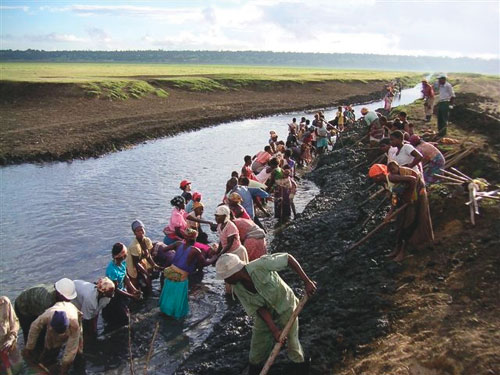Japan's Official Development Assistance White Paper 2005
Column II-10 The Struggle of a JOCV Member in Mozambique

Farmers building irrigation facilities (Photo: JICA)
The Japan Overseas Cooperation Volunteers (JOCV) celebrated its 40th anniversary this year (2005). In 2003, a total of 1,303 volunteers were dispatched throughout the world. Here we will present the activities of one volunteer, Mr. Tsukahara, who was dispatched to Mozambique.
JOCV member Mr. Tsukahara
Mozambique is located in southeast Africa and is easily affected by natural disasters, such as frequent droughts in dry season and floods in rainy season, especially in the south. As a result, the country is faced with the problem of difficult food production. It was two years ago that JOCV member Mr. Tsukahara came to a village in the Chibuto District in Gaza Province in southern Mozambique. This district has been affected by food shortages due to chronic flood damage. In particular, the flood that occurred in 2000 had blocked up irrigation channels with earth and sand, and land formerly cultivated into fields became impossible to cultivate and turned into swampland.
Against this backdrop, JOCV member Mr. Tsukahara is in charge of repairing these irrigation channels, in cooperation with the local farmers and the Chibuto District Agricultural Office (Direcções Distritais de Agricultura, DDA). Every day from 5am, a total of 600 people, not only local farmers and owners of farmland but also farmers' wives carrying infants on their backs and unemployed youths etc., work together on the reconstruction. In some places, they even need to stand in water that approaches their waists. It is low-profile work in grasslands laid waste by floods, where workers have to cut the grass while trying to avoid swarms of mosquitoes and poisonous snakes. The aspect of work with which Mr. Tsukahara struggles the most is raising the awareness of the local farmers and motivating them to continue participating in the hard work. The farmers help with the irrigation project primarily in their free time when not running their own farms. As a result, it takes such a long time to build these irrigation facilities for a vast area of 500 hectares (equivalent to approximately 100 Tokyo Domes) that the work frequently falls behind schedule. However Mr. Tsukahara has not easily relied on drilling equipment because he believes that the most important thing is farmers' willingness to improve the agricultural land with their own hands. Based on this belief, he has introduced the WFP Food-for-Work program (see 3 (4) of Part II, Chapter 2, Section 2 of the main text) in some districts, and began the practice of food distribution as wages for the irrigation. These patient efforts have steadily produced results: the living conditions of the farmers have begun to improve, and the construction work has been also gradually getting on track.
The farmers have a high expectation of Mr. Tsukahara as a leader. Specifically, he met joyful local people who have been able to plow their fields for the first time in five years, farmers wanting him to come and look at the irrigation channels they had dug themselves, and local residents doing their best to improve their own fields with their own hands. Although he has almost caved in to the pressure at times, Mr. Tsukahara has decided to extend his period of deployment by one year, which was originally two years ending in December 2005. Moreover, the complete confidence from DDA employees drives force behind daily project activities. The DDA employees work with dedication, skillfully supervising the local operation. Sometimes Mr. Tsukahara is let down by unmotivated residents, but he wants to help the farmers who are full of ambition to improve their fields through the irrigation project so that they can have a better life.


 Next Page
Next Page